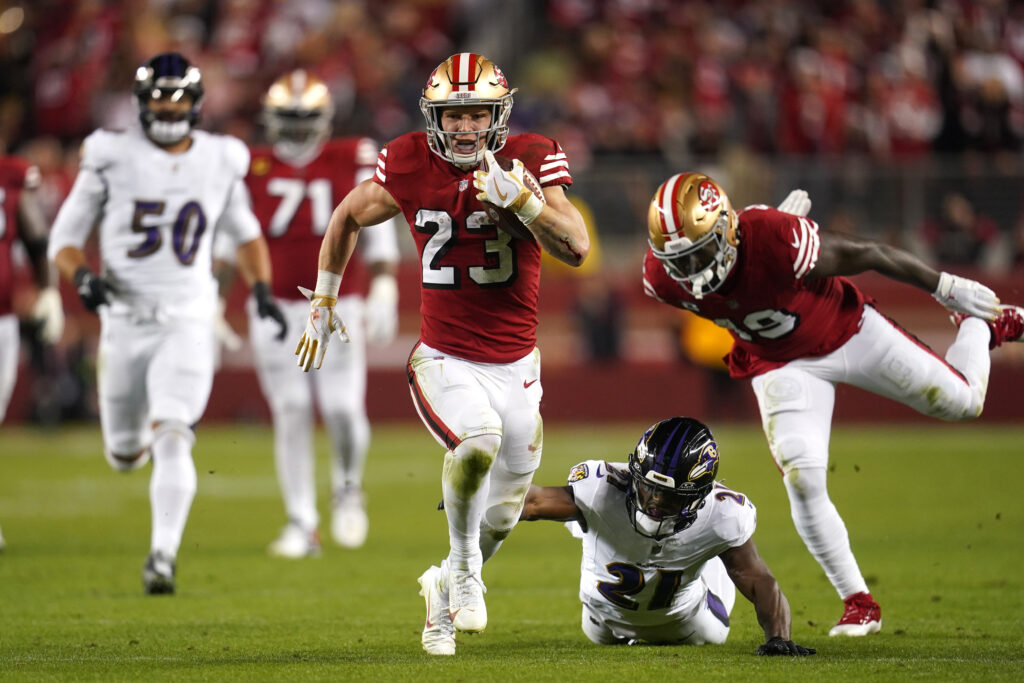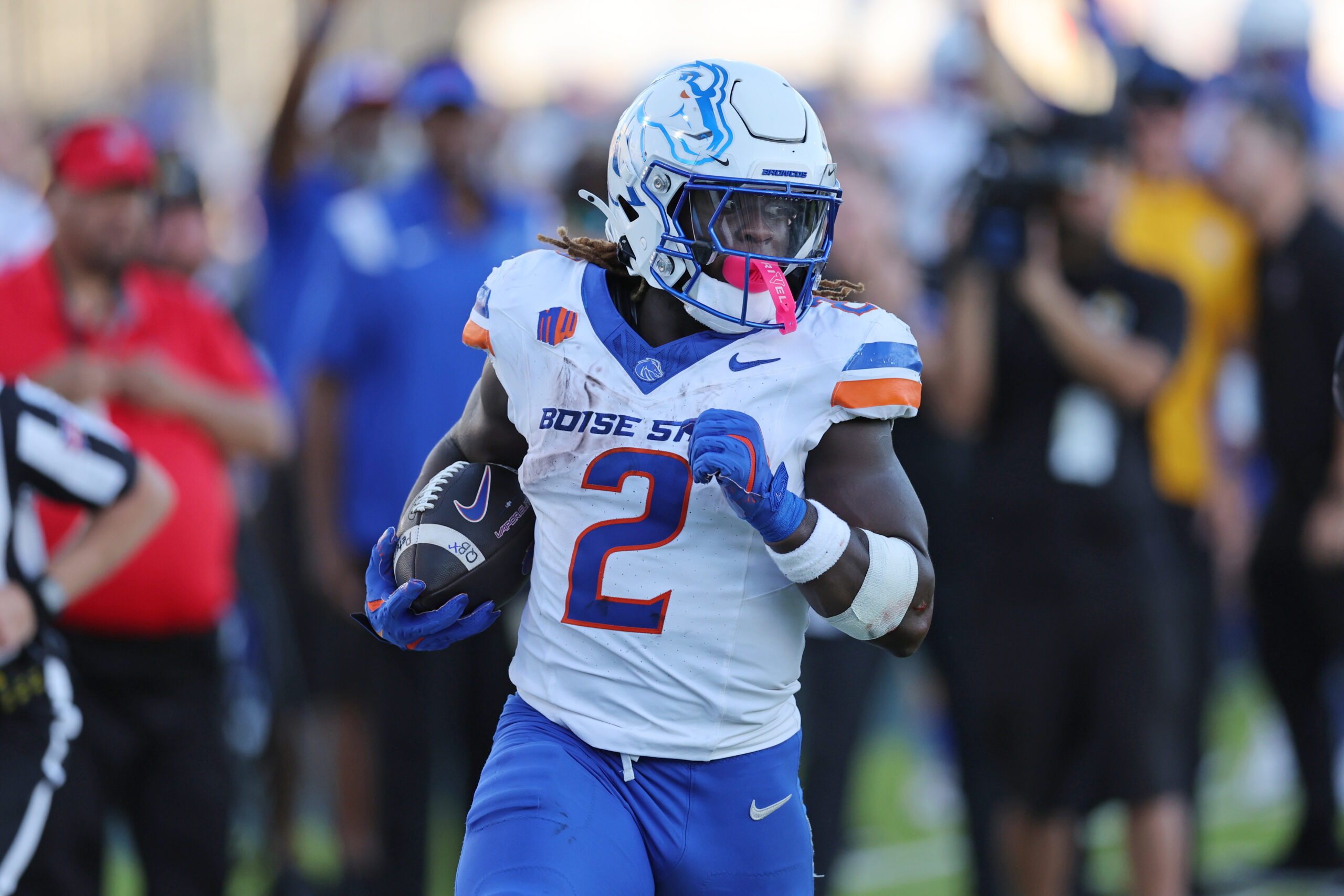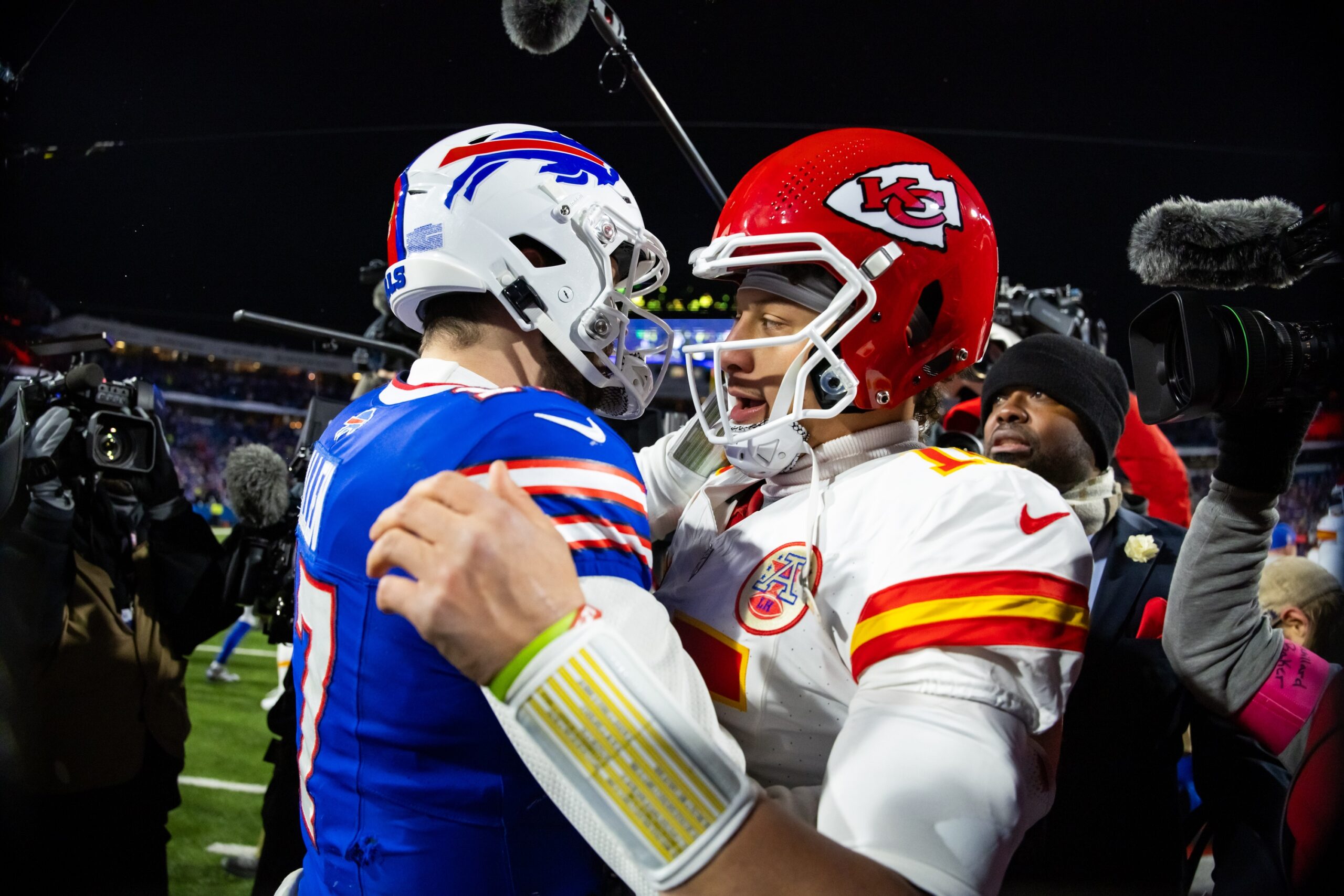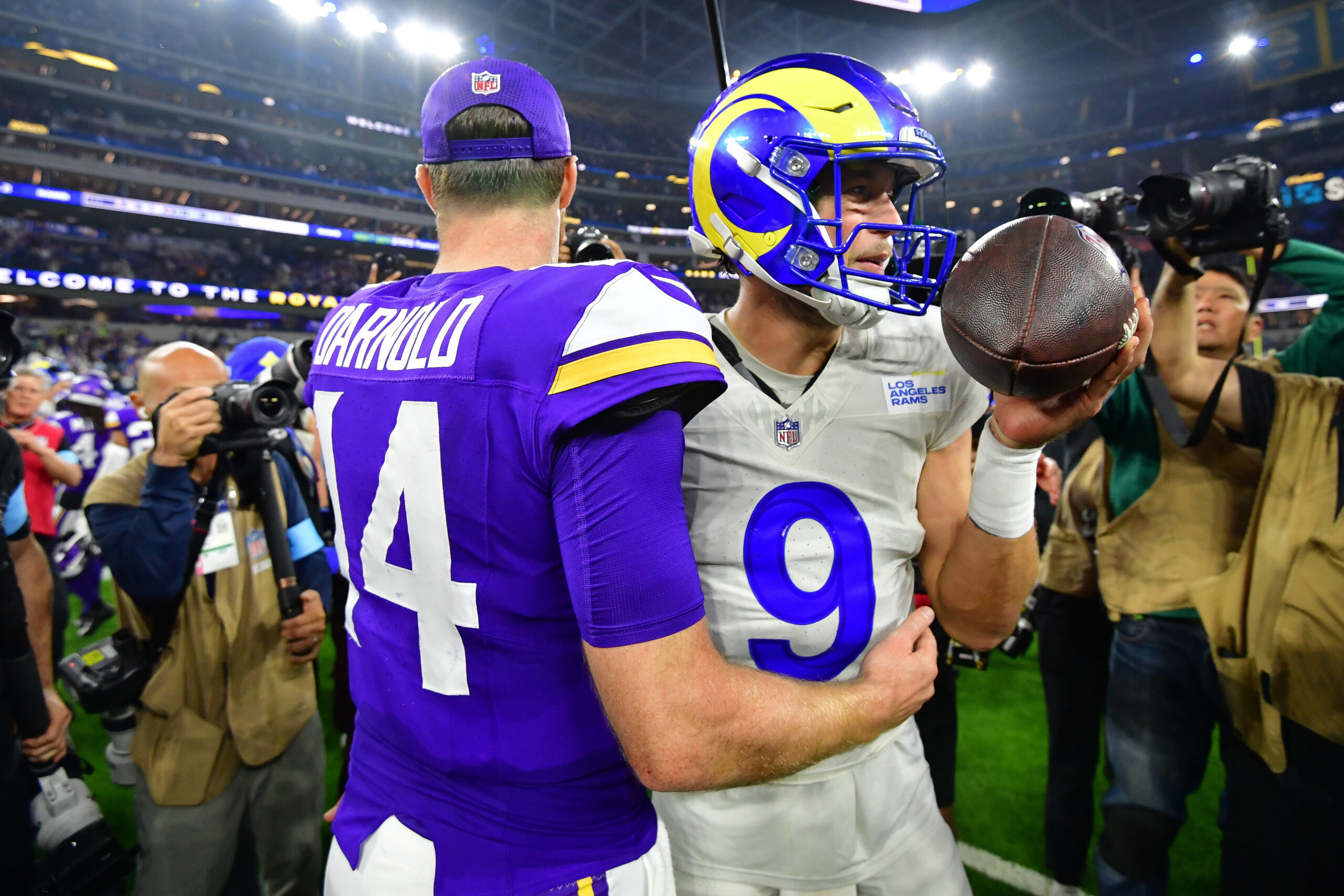Fantasy
1/11/24
8 min read
2024 Fantasy Football: Your Guide to the FFPC Playoff Challenge — Part 2

The Fantasy Football Player’s Championship (FFPC) Playoff Challenge was one of the first forms of playoff best ball. In this format, users select no more than one player from each playoff team to fill a roster consisting of 12 positions.
So the current roster is: one quarterback, two running backs, two wide receivers, four FLEX, one tight end, one kicker and one defense. And FPPC uses a tight-end premium scoring structure, with each reception at the position worth 1.5 points.
That’s it. Simple enough, right? There’s no salary and no draft; you just pick players from each team while leaving two teams out.
But even within those basic rules, there are ways to maximize your expected value. In Part One, we examined how to optimize rosters against the field. In Part Two, we’ll look at players and at how to approach going against ownership.
FFPC Playoff Challenge Strategy: What to Consider
Positional Scarcity
As I said in Part One, the two top-scoring positions this season were quarterback (QB1 averaged 24.1 points per game) and running back (the RB1 averaged 24.5 points per game). The drop-off from the WR1 to the WR12 was the smallest.
Those two things combine to create a scenario where we optimize for quarterback and running back production. Wide receiver production can theoretically be made up at a deeper position, and tight end is the most variant skill position.
Games Played
If quarterback and running back are the two highest-scoring positions, we theoretically want those positions to play the most games.
That means including wide receivers in the FLEX at a higher rate than running backs due to their increased production beyond the elites at the position, with emphasis placed on teams expected to play multiple games.
There is only one player in the player pool who breaks this mold: Christian McCaffrey.
Opportunity Cost
Only playing one player from each team creates opportunity cost. If I play McCaffrey, I can’t play Deebo Samuel, Brandon Aiyuk or George Kittle.
McCaffrey is a good example because he represents positional scarcity (he was by far the RB1 in fantasy this season), and his one-seed San Francisco 49ers are currently the betting favorites to represent the NFC in the Super Bowl (which would equal three games played).
Matchups
Matchups are one of the areas in this contest likely to be overlooked by the field.
For example, Kyren Williams is expected to be one of the most popular selections at running back.
But the Los Angeles Rams are currently road underdogs in their Super Wild-Card Weekend tilt against a Detroit Lions team that struggles through the air and is nails against the run. As such, both Cooper Kupp and Puca Nacua would theoretically be more valuable to rosters that are built with the assumption that the Lions advance to the next round.
Even if the Rams win that game, they are likely to play the 49ers — another demi-pass-funnel opponent.
Another example of micro matchups is Mike Evans against a Philadelphia Eagles defense that has struggled mightily against the pass all season. Evans has the role, red zone chops and deep ability to hang a crooked number against the Eagles. If the Tampa Bay Buccaneers win that game, they’d be large underdogs moving forward. Yet Evans is unlikely to be owned at a meaningful rate in this contest.
Team Scarcity
Not only do we have to compare players with the other choices at their respective positions, but we must also weigh individual profiles and ranges of outcomes against the other players on their team.
Let’s take the Lions as an example. Sam LaPorta is unlikely to play in the first round of the playoffs after suffering a hyperextended knee with accompanying bone bruise. And if he does suit up, the injury carries a dip in expected production.
That leaves the primary skill position players for the Lions as: Amon-Ra St. Brown, Jahmyr Gibbs and David Montgomery. That order represents their expected ranges of outcomes over the sample size of one game.
However, Gibbs has a viable path to an increased receiving role in LaPorta’s absence, providing enough of a boost to his range of outcomes to have the potential to outscore St. Brown over one game. That’s important because Detroit ownership in this contest is likely to fall on St. Brown.
The condensed nature of the Lions’ offense means we should try to have one member of it on every roster, particularly considering Detroit is a home favorite in its first-round matchup against the Rams.
Expected Field Behavior and Leverage
Considering that the Baltimore Ravens are the betting favorites to represent the AFC in the Super Bowl and that Lamar Jackson makes up such a large portion of their offense, expect him to carry the highest ownership at quarterback.
While that makes sense on paper, the fact that he plays the most valuable position in this contest and has a maximum of three games to play introduces some interesting leverage potential. For example, Josh Allen was the QB1 in fantasy this season (24.1 ppg) and has a maximum of four games to play.
Reports out of Baltimore indicate Mark Andrews could return for the Ravens’ first game of the playoffs. He’s expected to garner minuscule ownership in this contest because of the unknowns surrounding his health and his timeline. Allen-Andrews is an immense leverage opportunity.
Tyreek Hill is expected to be among the highest-owned players in this contest, making Raheem Mostert and De’Von Achane interesting leverage options at a position that is harder to fill behind McCaffrey.
Rosters that include one of the Miami Dolphins running backs should theoretically be built as if the Dolphins win their first game against the Kansas City Chiefs, making it highly interesting to pair either Harrison Butker or the Kansas City defense with either Miami back.
McCaffrey is, without a doubt, the most valuable singular entity in this contest; he led the league in fantasy points per game at all positions this season. He has positional scarcity, games played, matchups and opportunity cost on his side.
But in this contest, we have to consider team scarcity against his lofty expected ownership. Aiyuk, Samuel and Kittle can (and have) outscore McCaffrey in one game.
That means it’s a +EV endeavor to build rosters with one of the team’s primary pass-catchers with the assumption that the 49ers get upset in their first game. That’s highly unlikely, but it’s more likely to occur than the respective ownership on the other San Francisco pieces, generating inherent leverage in the process.
Travis Kelce is likely to be the highest-owned Kansas City player in this contest, leaving Patrick Mahomes, Isiah Pacheco and, to a lesser extent, Rashee Rice, as elite leverage options.
Mahomes is particularly intriguing as a quarterback with a maximum of four games played at the most important position to this contest. In other words, a bet here on Mahomes is a bet on the Chiefs going to the Super Bowl, which isn’t a far-fetched outcome.
Finally, both Nico Collins and Amari Cooper are likely to be on rosters at a lower rate than they should be. That has to do with the fact that their teams play in the Super Wild-Card Round in a game with the lowest spread of the first-round matchups (Browns -2.0).
That said, no pass-catcher was targeted at a higher rate over the final five weeks of the season than Cooper, and only CeeDee Lamb (five) and Hill (four) had more games of 30-plus PPR scores than Collins (three) this season — two of which came with Tank Dell out of the lineup over the final six games of the regular season.
The FFPC Playoff Challenge combines a simple format with a unique structure. Those of us thinking beyond the contest rules can gain an edge through game theory. This is one of my favorite contests of the year to attack for that reason.
There will be a lot of similar rosters in this contest due to the field’s perception of the playoff bracket and team dynamics and its misunderstanding of how to optimize rosters.
This contest can prove to be one of the more lucrative opportunities of the season for astute gamers. And its two price points — $35 and $200 — offer a reduced barrier to entry.
Enjoy the roster-building process, and we’ll see you at the top of the leaderboards for some postseason sweats!






